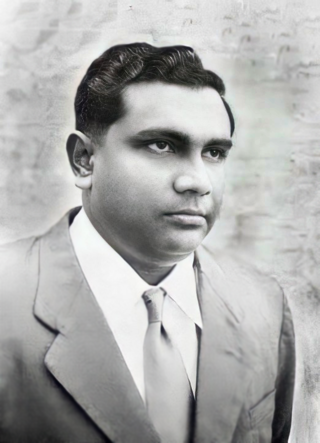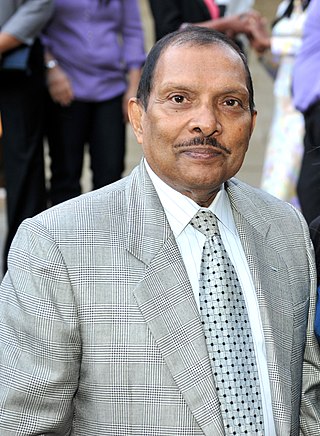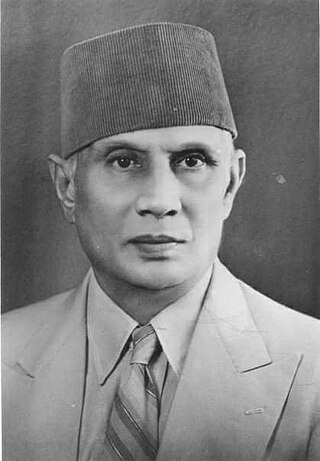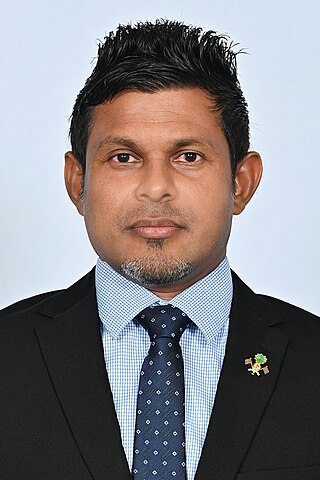
Abdul Sattar Moosa Didi (alternative name: Amir Abdul Sattar Faamudheyri Kilegefaanu) was Maldivian diplomat and politician. [1] He was born 1936 or 1937. [2] He died in November 2015 in Bangkok. [3]

Abdul Sattar Moosa Didi (alternative name: Amir Abdul Sattar Faamudheyri Kilegefaanu) was Maldivian diplomat and politician. [1] He was born 1936 or 1937. [2] He died in November 2015 in Bangkok. [3]
Didi started his public service career as secretary at the Representative Office of the Maldives in Colombo in 1957. [2] Then from 1960 to 1967 he was the representative in Ceylon. He was then Permanent Representative to the United Nations in New York City from 1967 to 1970, and ambassador to the USA between 1968 and 1970. In the government of President Ibrahim Nasir, he was Finance Minister from October 1970 to March 1975. [4] Between October 1975 and May 1977 he was one of the Vice Presidents of the Maldives together with Ahmad Hilmy Didi, Ibrahim Shihab, Ali Maniku and Hassan Zareer. [2]
During the tenure of Nasir's successor, Maumoon Abdul Gayoom, he was Minister of Education in the late 1970s. He was later Minister for Fisheries in the 1980s and, most recently, Minister for Health and Welfare in the 1990s. In 1998 Didi became chair of the council of the Maldives College of Higher Education (MCHE), which was renamed Maldives National University in 2011. During the mass demonstrations in September 2003, he chaired a presidential commission to investigate the circumstances surrounding the death of Evan Naseem, who previously died in prison with two other inmates under unexplained circumstances.
On 26 July 2011, Abdul Sattar Moosa Didi was conferred the Order of the Distinguished Rule of Izzuddin. [2]

The history of the Maldives is intertwined with the history of the broader Indian subcontinent and the surrounding regions, comprising the areas of South Asia and Indian Ocean; and the modern nation consisting of 26 natural atolls, comprising 1194 islands. Historically, the Maldives had a strategic importance because of its location on the major marine routes of the Indian Ocean. The Maldives' nearest neighbours are the British Indian Ocean Territory, Sri Lanka and India. The United Kingdom, Sri Lanka and some Indian kingdoms have had cultural and economic ties with the Maldives for centuries. In addition to these countries, Maldivians also traded with Aceh and many other kingdoms in, what is today, Indonesia and Malaysia. The Maldives provided the main source of cowrie shells, then used as a currency throughout Asia and parts of the East African coast. Most probably Maldives were influenced by Kalingas of ancient India who were earliest sea traders to Sri Lanka and the Maldives from India and were responsible for the spread of Buddhism. Stashes of Chinese crockery found buried in various locations in the Maldives also show that there was direct or indirect trade contact between China and the Maldives. In 1411 and 1430, the Chinese admiral Zheng He 鄭和 visited the Maldives. The Chinese also became the first country to establish a diplomatic office in the Maldives, when the Chinese nationalist government based in Taipei opened an embassy in Malé in 1966. This office has since been replaced by the embassy of the People's Republic of China.

Maumoon Abdul Gayoom is a Maldivian politician who served as president of the Maldives from 1978 to 2008. After serving as transport minister, he was nominated president by the People's Majlis and succeeded Ibrahim Nasir in 1978. He was defeated in the October 2008 presidential election.

Ibrahim Nasir Rannabandeyri Kilegefan, KCMG, NGIV was a Maldivian politician who served as the Prime Minister of the Maldives from 1957 to 1968 under the monarchy, and President from 1968 to 1978, when he decided to retire.

Sumuvvul Ameer Mohamed Amin Dhoshimeynaa Kilegefaanu, popularly known as Mohamed Amin Didi, was a Maldivian politician. He served as the first president of the Maldives and as the head of government between January 1, 1953, and August 21, 1953. Amin Didi was also the principal of Majeedhiyya School from 1946 to 1953.

Fathulla Jameel was the Minister of Foreign Affairs of Maldives from 1978 to 2005.
Majeediyya School is the first Maldivian government school, located in Malé, Maldives. It only accepted boys until the introduction of Primary Education in 2010, which allowed girls to attend the school as well. The English medium is followed throughout all subjects, with the exception of Dhivehi and Islam.

King Muhammad Fareed Didi, , the son of the Sultan Prince Abdul Majeed Didi, was the last Sultan of Maldives and the first Maldivian monarch to assume the title of "King" with the style of "His Majesty". He was the Sultan of the Maldives from March 7, 1954, until November 11, 1968. He was deposed in 1968 from the throne when Maldives became a republic, and died the following year in Maldives.
N.Velidhoo is one of the inhabited islands of Noonu Atoll in the Maldives. Information from Maldives bureau of statistics

The president of the Republic of Maldives is the head of state and head of government of the Republic of Maldives and the commander-in-chief of the Maldives National Defence Force.
Prince Abdulla is the given name for Prince Ibrahim Faamuladheyri Kilegefan, son of Sultan Muhammad Ghiyasuddin of the Dhiyamigili dynasty.
Dhadimagu is an administrative division of Fuvahmulah, Maldives. It is the largest division of the island, located in the northern part of the island. Throughout history, many scholars and famous public figures came into being from this district housing many of the historical sites and landmarks of the island. A center of learning as well as an important location for the island's economy, the number of 'Hafiz's and teachers from this district outnumber that of any other district in Fuvahmulah, and this district is considered by many to be the most educated and learning-centered district of Fuvahmulah.

The vice president of the Republic of Maldives is the second-highest official in the executive branch of the government of the Maldives, after the president of the Maldives, and ranks first in the presidential line of succession. The vice president is directly elected together with the president to a five-year term of office.
A constitutional referendum was held in the Maldives on 17 and 18 April 1952. The new constitution would convert the country from a monarchy to a republic.

Muliaage is the "Official Residence of the President of the Maldives". The Muliaage is located in the ward of Henveiru in the historic center of Malé. It is in close proximity of the Medhu Ziyaaraiy, the Friday Mosque, and the Munnaru.
Prime Minister of the Maldives was a public office in the Sultanate of the Maldives and the Republic of the Maldives.

The permanent representative of Maldives to the United Nations is the leader of the Maldives' diplomatic mission to the United Nations. It is customary that the permanent representative also be dually accredited as an ambassador to the United States of America. Since May 2019, the incumbent is Thilmeeza Hussain, the first woman to hold the post.
The Most Honourable Order of the Distinguished Rule of Izzuddin, or more informally the Order of Nishanizzuddeen, is the highest Maldivian honour which may be conferred upon a foreign national.

The Ministry of Finance of the Republic of Maldives is the ministry responsible for managing the public finances of the Maldives.

The depopulation of Havaru Thinadhoo was an event that took place in 1962, following the formation of the United Suvadive Republic, when Thinadhoo, the wealthiest island at the time was forcefully depopulated and destroyed.